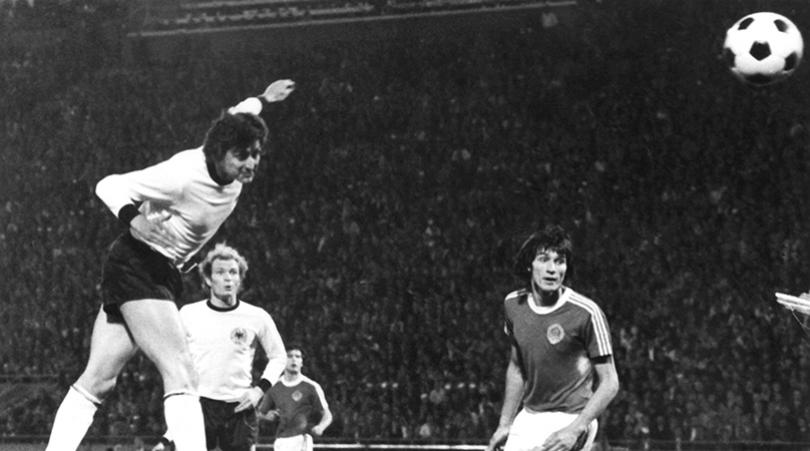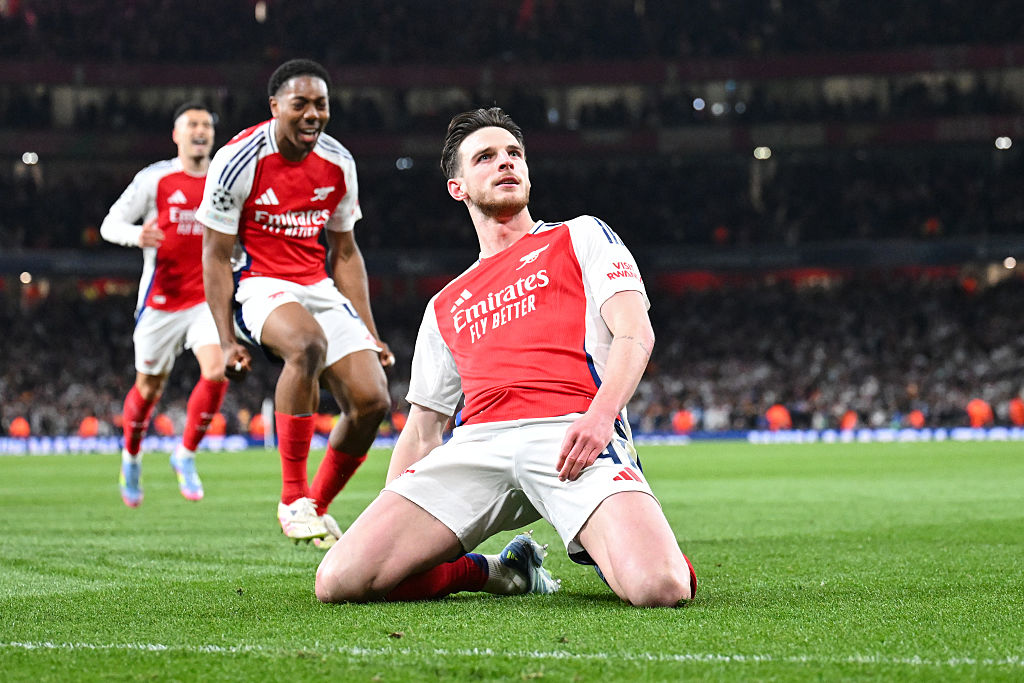On this day in the Euros, June 18: (Really) lucky Dutch break Irish hearts
Luck of the Irish? Don't count on it. They certainly didn't get any at Euro 88, writes Gary Parkinson...
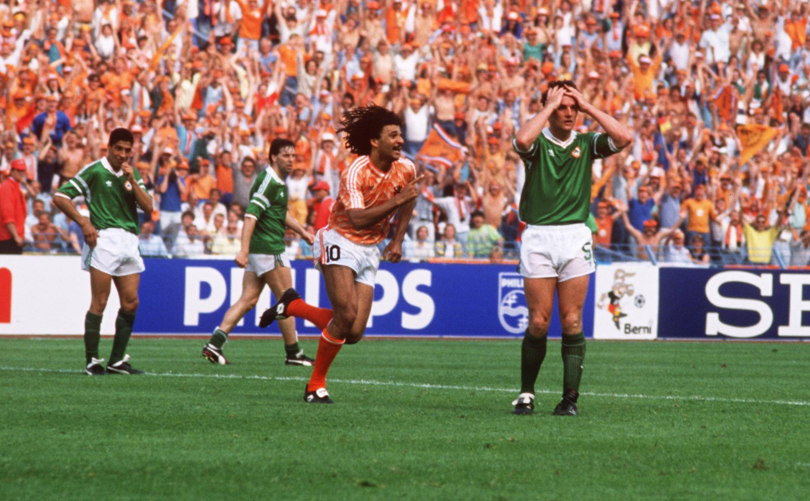
Euro 88 was a singularly interesting edition of the quadrennial continental beanfeast. Its average attendance of 56,656 is a competition record unlikely to be beaten; its 2.27 goals per game wouldn’t be matched until the turn of the millennium; and it featured no red cards, 0-0s or even extra time, let alone penalties.
How favourably you remember Euro 88 might very well depend on your nationality. West Germany and Italy failed to live up to their pre-tournament status as favourites, falling at the semis. The English narrative arc went from embarrassment through humiliation to ennui.
Dutch delight at a debut tournament victory was intensified by that semi-final victory over the hated Germans, but there was another nation who enjoyed almost every moment – perhaps bar one sickening moment on June 18.
The Republic of Ireland was a footballing backwater whose competition qualification record was zero from 19 attempts. Despite the occasional brilliant player – Johnny Giles, Frank Stapleton, Don Givens, Liam Brady, Johnny Carey – they hadn’t ever really developed a strong team.
Jackie mines the diaspora
The Republic of Ireland was a footballing backwater whose competition qualification record was zero from 19 attempts
Then they broke with tradition by hiring their first non-Irish manager. As an England player, Jack Charlton had won the World Cup; as a manager, he had had won promotions with Middlesbrough and Sheffield Wednesday.
Taking charge in early 1986 after the failure to qualify for the Mexico World Cup, the genial but tough Geordie instilled his team with discipline and ruthless tactical simplicity: get the ball forward and maximise set-pieces.
Get FourFourTwo Newsletter
The best features, fun and footballing quizzes, straight to your inbox every week.
Jack’s Ireland contained a disparate bunch of talents. At the back, the classy Paul McGrath dovetailed with the blunter Mick McCarthy or Kevin Moran. Skilful midfielders like Ronnie Whelan, John Sheridan, Kevin Sheedy and Ray Houghton were happy to support forceful strikers like Stapleton, Niall Quinn, Tony Cascarino and John Aldridge.
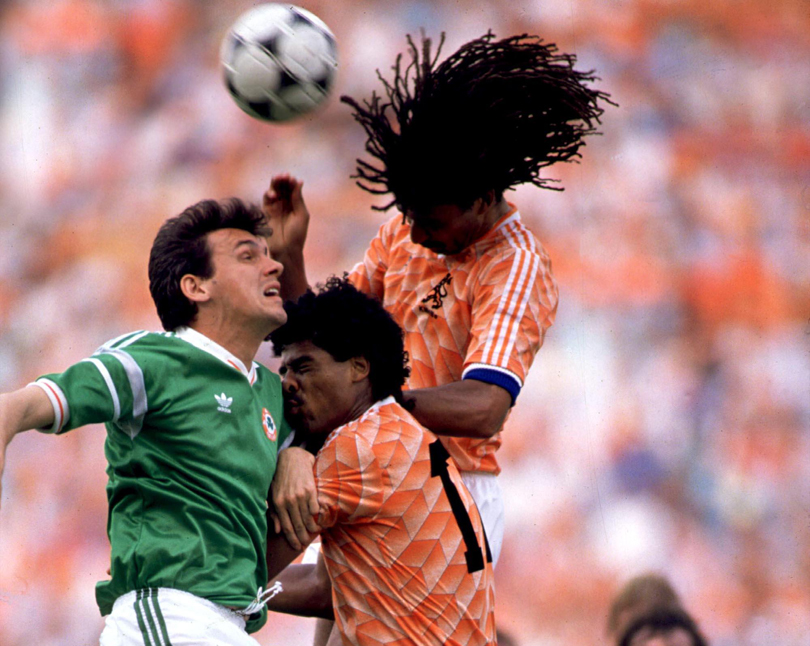
Some of these – McCarthy, Houghton, Sheridan, Aldridge, Cascarino and more – were born outside the country as part of the Irish diaspora, qualifying under the grandparents rule. They weren’t the first players to be “grandfathered in”, but Charlton was systematic and unrepentant about it.
“You want me to compete with the best in the world, I've got to have the f***ing best in the world,” he told the media. “And it's not here in Ireland that I can find it, I've got to go to England to find it, or Scotland.
“Now, if you don't want to do that, tell me, and I'll f***ing concentrate on the League of Ireland and we'll win nothing. But give me the freedom to produce results and I'll produce results." And he did: Charlton led them to qualification at the first attempt. The Green Army were off to Germany.
Beating the English
You want me to compete with the best in the world, I've got to have the f***ing best in the world
Enticingly, their first major tournament game was against England; deliciously, they won. Ray Houghton’s sixth-minute looped header was enough, along with the goalkeeping heroics of Packie Bonner.
It was a joyous occasion for the Irish fans, both inside Stuttgart’s Neckarstadion and back home. And it was sweet revenge for Jack Charlton, who had been turned down by the English FA in 1977.
Ireland then faced the Soviet Union in Hanover, and again took a first-half lead through a mixture of brute force (McCarthy’s huge throw) and skill (Whelan’s sumptuous hooked shot). Igor Belanov set up Oleg Protasov for the equaliser, but Ireland were joint-top of the group with one game to go.
That game was on June 18 against the Netherlands, who had lost their opener to the Russians but demolished the English 3-1 through Marco van Basten’s hat-trick. A draw would send the Irish through to the semi-finals, and 64,731 packed into Gelsenkirchen’s Parkstadion to see if they could keep the fairy tale going.
Style versus guile
Charlton was facing Rinus Michels, the man whose totaalvoetbal had dominated a continent. Since then the Dutch had had their own nadir, missing the tournaments in 1982, 1984 and 1986, but were on their way back to prominence thanks to a talented crop including Van Basten, Ruud Gullit and Frank Rijkaard alongside older hands like Arnold Muhren and Wim Kieft.
Did you know this about Marco van Basten? Click on the white box to find out something new...

Moments that rocked | FourFourTwo Euro 2016 Guide
FEATURE
Enter
16 moments that rocked the Euros
FEATURE
June 17, 11:55 PM
KickerThis is a kicker.
1. Van Basten goes from sub to superstar, 1988
He finished it with perhaps the finest goal the tournament has ever seen, a perfect dipping volley from an impossible angle as Arnold Muhrens deep cross dropped from the heavens.
What few will remember, though, is that Marco van Basten actually began Euro 88 warming the Dutch bench. But after they lost that opening group game against the USSR who they would beat in the final Van Basten destroyed England with a hat\-trick in the next game and slid home an 88th\-minute winner against hosts and bitter rivals West Germany in the semis. But after Ruud Gullits headed opener, he saved his best for last.
2. Portugal lose
their shirt, 2000
Theres no shame in being undone by Zinedine Zidane at the peak of his powers, but it was enough for Portugal to collectively lose the plot, as they maniacally berated the officials in the Brussels semi\-final.
As Abel Xaviers goal\-line handball was spotted by the linesman and Zizou scored the golden goal penalty, they embarked on an appalling mass protest that resulted in Nuno Gomes being sent off and banned for eight months, Paulo Bento for six, and mad\-haired Xavier for nine.
Said Gomes: I didnt throw my shirt at the ref I wanted to give it to him so every time he looked at it, hed remember what he did to our nation. Thats all right then.
3. Greece is the word, 2004
Its the biggest shock ever in international competition, said Angelos Charisteas after his headed winner saw off hosts Portugal.
Having scraped through the group stage \(which also featured Portugal\), another Charisteas header did for the French, before Traianos Dellass noggin saw off the Czech Republic in the semis. Three headers, three 1\-0 wins, one almighty smash and grab. No wonder the Greek media dubbed Otto Rehhagels unfancied thieves the Pirate Ship. Arrrgghh!
4. World, meet
Wazza, 2004
Before 2002, none of us even knew what a metatarsal was. Soon, they were ruining English dreams every other June. After Becks in Japan, it was Wayne Rooneys turn two years later.
This, after the 18\-year\-old looked like firing Svens men to glory almost single handedly. He ran France ragged in the opening game before Zidanes late show, then scored a brace against both Switzerland and Croatia, and was just beginning to put Figo, Ronaldo & Co. to the sword in the quarter\-finals when the dreaded fractured foot struck. Wazza went off, England lost on penalties, but an international star had been born.
5. Cruyffs Oranje see
a lot of red, 1976
The European Championship in 1976 would be Johan Cruyffs last international tournament, but he couldnt sign off in style. Level at 1\-1 and with an extra man, the semi\-final against Czechoslovakia looked there for the taking, but the Dutch somehow contrived to lose.
First the other Johan, Neeskens, was sent off, then a booking for Cruyff meant hed miss the final. And when the Czechs scored in extra time after one of a million fouls on Cruyff went unnoticed, Wim van Hanegem refused to kick off and got a red card for his troubles.
6. Bierhoffs golden handshake, 1996
I was delighted to meet such an important man, said Oliver Bierhoff without a shred of Teutonic irony, after being rewarded for scoring the Euros first golden goal in the 1996 final by getting to shake the hand of, er, John Major.
The Chelsea\-supporting British PM almost witnessed an upset at Wembley, after the Czech Republic who were comfortably beaten by the Germans in their opening group game took the lead through Patrik Bergers 59th\-minute penalty. But Bierhoff who was reportedly named in Germanys squad on the recommendation of coach Berti Vogts wife headed home the equaliser just minutes after coming on as a substitute before squeezing home the sudden\-death winner in extra time.
7. The Euros greatest ever game? 2000
If ever a celebratory bundle was warranted, the denouement of the best game in what was a thrilling tournament was it. In a Bruges ding\-dong battle, Yugoslavia thrice took the lead the third time after just having a man sent off in what was also a spiky encounter but Spain just didnt know when they were beaten.
Their third equaliser came in the 94th minute, Gaizka Mendieta coolly slotting home a penalty, and their winner in the 96th when Alfonsos scuffed volley sparked a 23\-man pile\-up by the corner flag. When everybody had calmed down, it emerged that Yugoslavia had also qualified for the quarter\-finals where they got thrashed 6\-1 by Holland. And after all that effort, too.
8. French supersubs break Azzurri hearts, 2000
I feel like shooting myself, said Dino Zoff, after his Italy team plucked defeat from the jaws of victory in a dramatic final. Trailing 1\-0 to Marco Delvecchios goal, France coach Roger Lemerre threw on Robert Pires, Sylvain Wiltord and David Trezeguet to try to break down a heroic Italian rearguard.
Lemerres plan worked... in the nick of time. First Wiltord slid the ball home in the 94th minute to force extra time, and then Pires cut the ball back for Trezeguet to ram home the golden goal winner in extra time, to spark a famous shirtless celebration. Days later, Zoff got his wish, as the Italian FA controversially fired him.
9. Panenkas chocolate chip, 1976
The cheekiest moment in Euros history. After a 2\-2 draw with Germany sent the Euro 76 Final to penalties, Czechoslovakia midfielder Antonin Panenka stepped up to take the crucial tournament\-winning kick. Panenka had spent years practising pens against Zdenek Hruska, wagering chocolate and beer on the outcome.
After realising keepers generally dive early, he concluded: Its easier to score by feinting, then tapping down the middle. And thats just what he did here, immediately making himself a legend. The only downside? I started getting fat because I won back all those chocolates.
10. When it rains it \(really\) pours, 2012
Ukraine had only been playing France for four minutes and 20 seconds when an electric storm drowned their Group D clash to postponement. As thunder boomed and lightning crackled up above it was feared that the game would be called off altogether, but referee Bjorn Kuipers led the two sides back on almost an hour later for _les Bleus_ to win 2\-0 at the sodden Donbass Arena.
If that felt like a damp squib for hosts Ukraine, they duly lost 1\-0 to England four days later and crashed out at the group stage.
11. Yugoslavia thrown out so what? 1992
UN Security Council Resolution 757 officially banned Yugoslavia from Euro 92, but once civil war broke out in 1991, the writing had been on the wall for the Plavi.
Ivica Osims team had romped to qualification in Group Four, and with the bulk of the team coming from the 1987 FIFA Youth Team World Championship\-winning team, Pancev, Boban, Savicevic, Prosinecki and Suker were tipped for big things in 92. But it wasnt to be. Their place was taken by group runners\-up Denmark, but they werent up to much
12. Danes bring home the bacon, 1992
Oh, they were. But after their late call\-up, the Danes understandably looked rusty at the start of Euro 92. After drawing with England and losing to hosts Sweden, a 2\-1 win over France helped them squeak through the group stages, before they hit form in their semi against the Dutch.
Henrik Larsen \(no, not that one\) bagged a brace in a 2\-2 draw, but Manchester Uniteds Peter Schmeichel was the hero, saving Marco van Bastens spot\-kick in the shootout as the Danes went through to face a newly unified Germany in the final. The fairy tale was complete when a John Jensen rocket set them on their way to a shock 2\-0 win. Not bad for a bunch of beach bums, ran a mocking Danish newspaper headline.
13. Bend it like
Geller, 1996
Gary McAllister may have been wary of David Seamans powers as he stepped up to the penalty that would have brought Scotland level in this Euro 96 group game but he hadnt reckoned against an Israeli spoon\-bender hovering above Wembley in a helicopter. I said one, two, three, move as the kick was taken and it did, said Uri Geller, before adding: For the ball to move on its own was a 50 billion to one shot.
England won, and the mentalist was swamped with hate mail from Scottish postcodes. I vowed never to use my powers in football again after that, he said, a promise he kept \(apart from at Arsenal, Newcastle, Exeter City, Bolton, Brazil and Reading\).
14. Conspiracy!
cry Italians \(for a change\), 2004
Scandinavian stitch\-up or Italian cock\-up? You decide. Francesco Totti, having been caught spitting at his Danish man marker in an appalling 0\-0 stalemate, bizarrely claimed hed fallen into an elaborate Danish trap, then the Azzurri failed to finish off Sweden, despite dominating possession in a 1\-1 draw. Giovanni Trapattonis men beat Bulgaria in their final group match, but were eliminated on goal difference after Denmark and Sweden drew 2\-2 courtesy of Mattias Jonsons 89th\-minute leveller.
Both Nordic sides linked arms at the final whistle, after progressing to the knockout stages. A series of articles appeared screaming Combine! \(fix\) but at least Alessandro Del Piero was a voice of reason, admitting: We must blame ourselves for negative tactics.
15. Platini puckers up, 1984
It was hardly the cherry on top of the icing on the cake, but Michel Platini earning himself a pair of smackers from President Mitterrand after leading France to glory on home soil reflected just how much the country had to thank their star midfielder for.
Assisted by the rest of _les Bleus_ Magic Square midfield he may have been, but this was essentially a one\-man show. Hat\-tricks against Yugoslavia and Belgium, a brace in an epic semi against Portugal including a winner in the last minute of extra time and the winner in the final \(albeit fortuitously\) cemented Platinis place as the finest European player of his generation, and won him two kisses from frisky Francois. Every silver lining
16. Holland pay the penalty again, 2000
England may have hang\-ups with penalties, but the Dutch took it to an extreme in 2000. Having blown it previously on spot\-kicks in three tournaments, they surpassed themselves in the semi\-final against Italy, missing five in total.
The prime culprit was Frank de Boer, who missed one in normal time, and then, with a nervous wink at Francesco Toldo and a stuttering run\-up, blew it in the shootout. The entire country has a mental problem with penalties, said Johan Cruyff, although the Dutch finally got their act together four years later, defeating Sweden on spot\-kicks.
However, in this clash of the styles it was the Irish who created the best chance, Paul McGrath rising to nod against the post from Ray Houghton’s corner – their only flag-kick of the game.
McGrath had been playing in midfield but relocated to right-back thanks to Chris Morris’s injury, and would have looked as just as home in orange as in green. But McGrath, and Ireland, were powerless against what must go down as one of history’s most fortuitous winners.
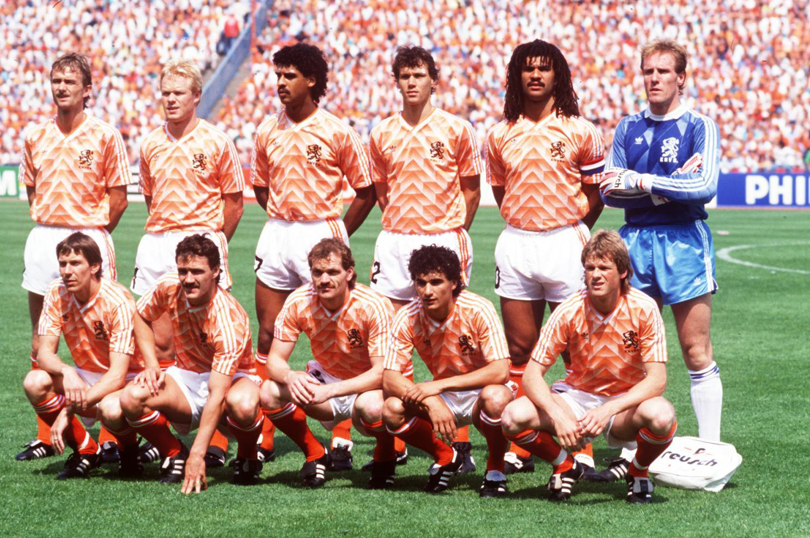
In the 82nd minute, a Dutch cross from Jan Wouters sailed over Van Basten and McGrath headed clear. It fell to Ronald Koeman just outside the D, but the big blond shanked his volley into the floor. It was sailing well wide of Bonner’s right-hand post until Kieft, stood outside the post and 12 yards out, flung his head at it.
Kieft had done well to react, but the ball was going 15 yards wide of Bonner’s other post. Well, it was until it hit the ground, and physics took over. Some combination of Koeman’s shot and Kieft’s deflection had imparted such spin on the ball that it skipped up and lurched sickeningly towards Bonner’s goal.
The brilliant Irish goalkeeper reacted immediately, throwing himself toward the ball, but it was too near the corner and bumbled almost apologetically into the net. It’s a video to show to anyone who ever unambiguously uses the phrase “The Luck of the Irish”; it’s worth noting that the word “luck” comes from Middle Dutch, and on this day the Netherlands embodied fortune.
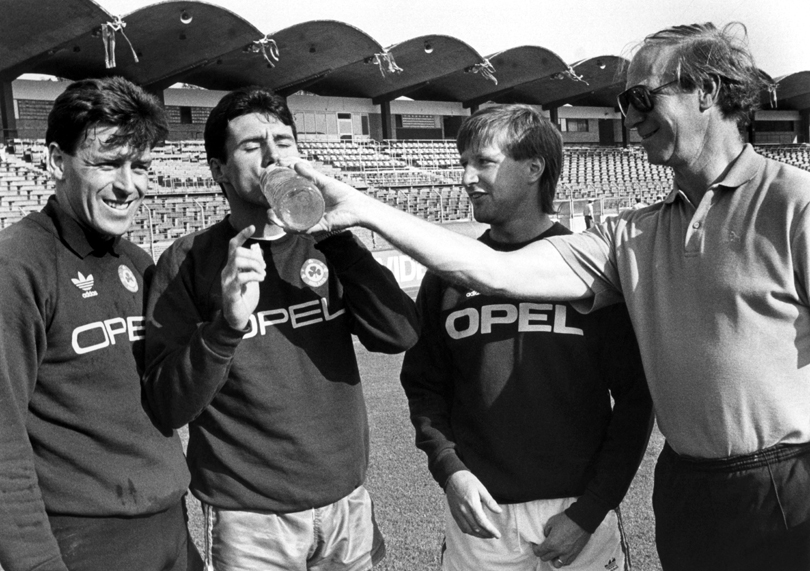
What happened next
The Irish fans were undaunted, singing their hearts out for the rest of the game and a full half-hour afterwards in the Parkstadion. Charlton would lead them to the knockout stages of Italia 90 and USA 94 and will never again need to buy a drink in a bar containing an Irish fan.
The Dutch would go on to win the tournament, beating their old rivals the Germans along the way and cultivating a confident generation who in turn inspired another major crop of young talent in the ‘90s; by seamlessly incorporating them, the Oranje reached the Italia 90 knockouts, Euro 92 semis, USA 94 quarters, Euro 96 quarters, France 98 semis and Euro 2000 semis.
Euro 2016 on FFT.com • Our shiny, expert Euro 2016 guide
Gary Parkinson is a freelance writer, editor, trainer, muso, singer, actor and coach. He spent 14 years at FourFourTwo as the Global Digital Editor and continues to regularly contribute to the magazine and website, including major features on Euro 96, Subbuteo, Robert Maxwell and the inside story of Liverpool's 1990 title win. He is also a Bolton Wanderers fan.
